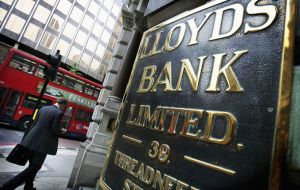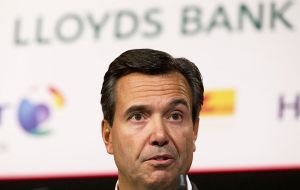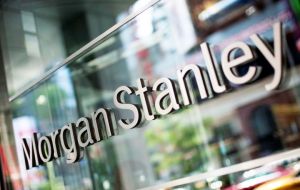MercoPress. South Atlantic News Agency
Lloyds Bank returns to private sector; at height of financial crisis government held 43% of shares
 The UK government has been slowly selling its stake in Lloyds for five years. Ministers claim all public money used to buy Lloyds shares has been returned.
The UK government has been slowly selling its stake in Lloyds for five years. Ministers claim all public money used to buy Lloyds shares has been returned.  At last week's annual meeting, Lloyds CEO Antonio Horta Osorio told shareholders he expected the government to make at least £500m from the bailout.
At last week's annual meeting, Lloyds CEO Antonio Horta Osorio told shareholders he expected the government to make at least £500m from the bailout.  Shares have been sold off by Morgan Stanley at below the 73.5p average price paid in the three-stage bailout.
Shares have been sold off by Morgan Stanley at below the 73.5p average price paid in the three-stage bailout. The British government has confirmed its remaining shares in Lloyds Banking Group have been sold, eight years after pumping in £20bn to save it. Lloyds Bank said the government will see a return of £21.2bn on its investment.
At the height of the financial crisis taxpayers owned 43% of Lloyds. Its return to the private sector is in stark contrast with the other bailed-out bank - Royal Bank of Scotland - that is still 73% owned by taxpayers.
The government has been slowly selling down its stake in Lloyds for the past five years. Ministers have claimed that all the public money used to buy Lloyds shares has been returned.
However, the true cost is disputed, with some critics claiming the lost interest has not been taken into account. Others have argued that the heavy losses previously suffered by Lloyds also hit the government's stake.
Either way, the £20.3bn of public funds used to buy the shares had already been recouped due to dividend payments made to all shareholders.
At last week's annual meeting, Lloyds chief executive António Horta Osório told shareholders he expected the government to make at least £500m from the bailout. But on Wednesday morning he said the true figure was closer to £900m.
“Today the government has sold its last shares in Lloyds Banking Group, receiving more money than was originally invested.”
The shares have been sold off by Morgan Stanley at below the 73.5p average price paid in the three-stage bailout. But taking the dividend payments into account means the total £20bn outlay has already been repaid.
Former chancellor George Osborne had hoped to offer the shares at a discount direct to the public, with a campaign similar to the classic Tell Sid campaign for British Gas in the 1980s.
The turnaround has not been without pain. About 57,000 jobs have been cut at Lloyds as it returned to profitability. The EU also forced the bank to sell 600 branches due to competition rules and £17bn was set aside to fund PPI mis-selling - the biggest bill for any of the banks caught up in the scandal.
But this year a £4.3bn profit - the biggest in a decade - finally allowed the bank to put its past behind it.
While the sale of the Lloyds stake marks a major turning point for the bank, taxpayers' other bailed-out institution - RBS - remains firmly in government hands. RBS was rescued with a £45bn bailout in 2008 and 2009 and has failed to turn a profit since.
The bank recently posted a ninth consecutive year in the red, with losses of £7bn, bringing total losses since the bailout to £58bn. The lender still faces £5.9bn of charges related to historic misconduct issues and potential legal costs.




Top Comments
Disclaimer & comment rulesCommenting for this story is now closed.
If you have a Facebook account, become a fan and comment on our Facebook Page!